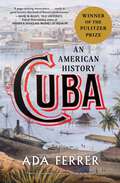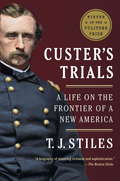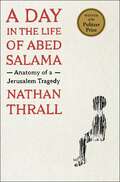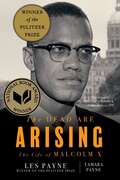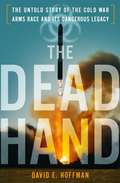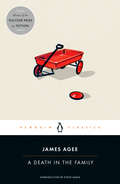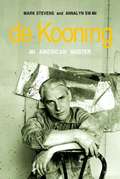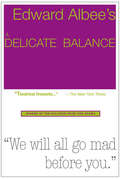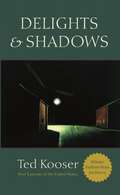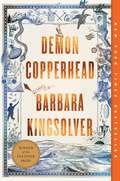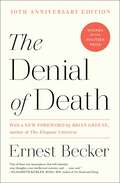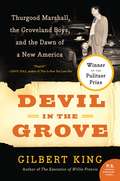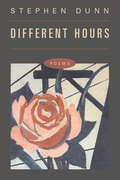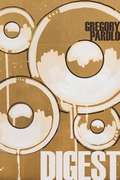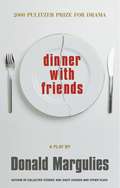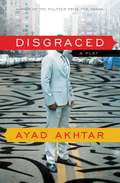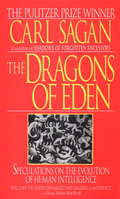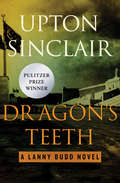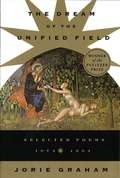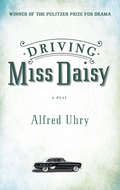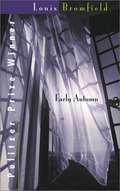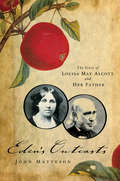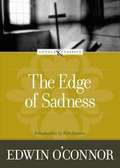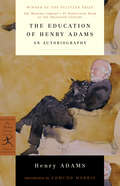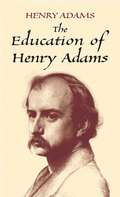Special Collections
Pulitzer Prize Award Winners
Description: Bookshare is pleased to offer the following titles, winners of the Pulitzer Prize Award. Note: Some drama winners are available and are listed under Fiction awards. #award
- Table View
- List View
Cuba (Winner of the Pulitzer Prize)
by Dr. Ada FerrerWINNER OF THE PULITZER PRIZE IN HISTORY WINNER OF THE LOS ANGELES TIMES BOOK PRIZE IN HISTORY &“Full of…lively insights and lucid prose&” (The Wall Street Journal) an epic, sweeping history of Cuba and its complex ties to the United States—from before the arrival of Columbus to the present day—written by one of the world&’s leading historians of Cuba.In 1961, at the height of the Cold War, the United States severed diplomatic relations with Cuba, where a momentous revolution had taken power three years earlier. For more than half a century, the stand-off continued—through the tenure of ten American presidents and the fifty-year rule of Fidel Castro. His death in 2016, and the retirement of his brother and successor Raúl Castro in 2021, have spurred questions about the country&’s future. Meanwhile, politics in Washington—Barack Obama&’s opening to the island, Donald Trump&’s reversal of that policy, and the election of Joe Biden—have made the relationship between the two nations a subject of debate once more. Now, award-winning historian Ada Ferrer delivers an &“important&” (The Guardian) and moving chronicle that demands a new reckoning with both the island&’s past and its relationship with the United States. Spanning more than five centuries, Cuba: An American History provides us with a front-row seat as we witness the evolution of the modern nation, with its dramatic record of conquest and colonization, of slavery and freedom, of independence and revolutions made and unmade. Along the way, Ferrer explores the sometimes surprising, often troubled intimacy between the two countries, documenting not only the influence of the United States on Cuba but also the many ways the island has been a recurring presence in US affairs. This is a story that will give Americans unexpected insights into the history of their own nation and, in so doing, help them imagine a new relationship with Cuba; &“readers will close [this] fascinating book with a sense of hope&” (The Economist). Filled with rousing stories and characters, and drawing on more than thirty years of research in Cuba, Spain, and the United States—as well as the author&’s own extensive travel to the island over the same period—this is a stunning and monumental account like no other.
Custer's Trials
by T. J. StilesWinner of the 2016 Pulitzer Prize for HistoryFrom the winner of two Pulitzer Prizes and a National Book Award, a brilliant biography of Gen. George Armstrong Custer that radically changes our view of the man and his turbulent times.In this magisterial biography, T. J. Stiles paints a portrait of Custer both deeply personal and sweeping in scope, proving how much of Custer's legacy has been ignored. He demolishes Custer's historical caricature, revealing a volatile, contradictory, intense person--capable yet insecure, intelligent yet bigoted, passionate yet self-destructive, a romantic individualist at odds with the institution of the military (he was court-martialed twice in six years). The key to understanding Custer, Stiles writes, is keeping in mind that he lived on a frontier in time. In the Civil War, the West, and many areas overlooked in previous biographies, Custer helped to create modern America, but he could never adapt to it. He freed countless slaves yet rejected new civil rights laws. He proved his heroism but missed the dark reality of war for so many others. A talented combat leader, he struggled as a manager in the West. He tried to make a fortune on Wall Street yet never connected with the new corporate economy. Native Americans fascinated him, but he could not see them as fully human. A popular writer, he remained apart from Ambrose Bierce, Mark Twain, and other rising intellectuals. During Custer's lifetime, Americans saw their world remade. His admirers saw him as the embodiment of the nation's gallant youth, of all that they were losing; his detractors despised him for resisting a more complex and promising future. Intimate, dramatic, and provocative, this biography captures the larger story of the changing nation in Custer's tumultuous marriage to his highly educated wife, Libbie; their complicated relationship with Eliza Brown, the forceful black woman who ran their household; as well as his battles and expeditions. It casts surprising new light on a near-mythic American figure, a man both widely known and little understood.From the Hardcover edition.
A Day in the Life of Abed Salama
by Nathan ThrallImmersive and gripping, an intimate story of a deadly accident outside Jerusalem that unravels a tangle of lives, loves, enmities, and histories over the course of one revealing, heartbreaking day.
Five-year-old Milad Salama is excited for a school trip to a theme park on the outskirts of Jerusalem. On the way, his bus collides with a semitrailer. His father, Abed, gets word of the crash and rushes to the site. The scene is chaos—the children have been taken to different hospitals in Jerusalem and the West Bank; some are missing, others cannot be identified. Abed sets off on an odyssey to learn Milad’s fate. It is every parent’s worst nightmare, but for Abed it is compounded by the maze of physical, emotional, and bureaucratic obstacles he must navigate because he is Palestinian. He is on the wrong side of the separation wall, holds the wrong ID to pass the military checkpoints, and has the wrong papers to enter the city of Jerusalem. Abed’s quest to find Milad is interwoven with the stories of a cast of Jewish and Palestinian characters whose lives and histories unexpectedly converge.
In A Day in the Life of Abed Salama, Nathan Thrall—hailed for his “severe allergy to conventional wisdom” (Time)—offers an indelibly human portrait of the struggle over Israel/Palestine and a new understanding of the tragic history and reality of one of the most contested places on earth.
The Dead Are Arising
by Les Payne and Tamara PayneAn epic, award-winning biography of Malcolm X that draws on hundreds of hours of personal interviews and rewrites much of the known narrative. Les Payne, the renowned Pulitzer Prize–winning investigative journalist, embarked in 1990 on a nearly thirty-year-long quest to create an unprecedented portrait of Malcolm X, one that would separate fact from fiction. The result is this historic, National Book Award–winning biography, which interweaves previously unknown details of Malcolm X’s life—from harrowing Depression-era vignettes to a moment-by-moment retelling of the 1965 assassination—into an extraordinary account that contextualizes Malcolm X’s life against the wider currents of American history. Bookended by essays from Tamara Payne, Payne’s daughter and primary researcher, who heroically completed the biography after her father’s death in 2018, The Dead Are Arising affirms the centrality of Malcolm X to the African American freedom struggle.
The Dead Hand
by David HoffmanThe Dead Hand is the suspense-filled story of the people who sought to brake the speeding locomotive of the arms race, then rushed to secure the nuclear and biological weapons left behind by the collapse of the Soviet Union—a dangerous legacy that haunts us even today.
The Cold War was an epoch of massive overkill. In the last half of the twentieth century the two superpowers had perfected the science of mass destruction and possessed nuclear weapons with the combined power of a million Hiroshimas. What’s more, a Soviet biological warfare machine was ready to produce bacteria and viruses to sicken and kill millions. In The Dead Hand, a thrilling narrative history drawing on new archives and original research and interviews, David E. Hoffman reveals how presidents, scientists, diplomats, soldiers, and spies confronted the danger and changed the course of history.
The Dead Hand captures the inside story in both the United States and the Soviet Union, giving us an urgent and intimate account of the last decade of the arms race. With access to secret Kremlin documents, Hoffman chronicles Soviet internal deliberations that have long been hidden. He reveals that weapons designers in 1985 laid a massive “Star Wars” program on the desk of Soviet leader Mikhail Gorbachev to compete with President Reagan, but Gorbachev refused to build it. He unmasks the cover-up of the Soviet biological weapons program. He tells the exclusive story of one Soviet microbiologist’s quest to build a genetically engineered super-germ—it would cause a mild illness, a deceptive recovery, then a second, fatal attack. And he details the frightening history of the Doomsday Machine, known as the Dead Hand, which would launch a retaliatory nuclear strike if the Soviet leaders were wiped out.
When the Soviet Union collapsed, the dangers remained. Soon rickety trains were hauling unsecured nuclear warheads across the Russian steppe; tons of highly-enriched uranium and plutonium lay unguarded in warehouses; and microbiologists and bomb designers were scavenging for food to feed their families.
The Dead Hand offers fresh and startling insights into Reagan and Gorbachev, the two key figures of the end of the Cold War, and draws colorful, unforgettable portraits of many others who struggled, often valiantly, to save the world from the most terrifying weapons known to man.
Pulitzer Prize Winner
A Death in the Family
by James Agee and Steve EarlePublished in 1957, two years after its author's death at the age of forty-five, A Death in the Family remains a near-perfect work of art, an autobiographical novel that contains one of the most evocative depictions of loss and grief ever written.
As Jay Follet hurries back to his home in Knoxville, Tennessee, he is killed in a car accident-a tragedy that destroys not only a life, but also the domestic happiness and contentment of a young family.
A novel of great courage, lyric force, and powerful emotion, A Death in the Family is a masterpiece of American literature.
Pulitzer Prize Winner
De Kooning
by Mark Stevens and Annalyn SwanWillem de Kooning is one of the most important artists of the twentieth century, a true “painter’s painter” whose protean work continues to inspire many artists. In the thirties and forties, along with Arshile Gorky and Jackson Pollock, he became a key figure in the revolutionary American movement of abstract expressionism. Of all the painters in that group, he worked the longest and was the most prolific, creating powerful, startling images well into the 1980s. The first major biography of de Kooning captures both the life and work of this complex, romantic figure in American culture. Ten years in the making, and based on previously unseen letters and documents as well as on hundreds of interviews, this is a fresh, richly detailed, and masterful portrait. The young de Kooning overcame an unstable, impoverished, and often violent early family life to enter the Academie in Rotterdam, where he learned both classic art and guild techniques. Arriving in New York as a stowaway from Holland in 1926, he underwent a long struggle to become a painter and an American, developing a passionate friendship with his fellow immigrant Arshile Gorky, who was both a mentor and an inspiration. During the Depression, de Kooning emerged as a central figure in the bohemian world of downtown New York, surviving by doing commercial work and painting murals for the WPA. His first show at the Egan Gallery in 1948 was a revelation. Soon, the critics Harold Rosenberg and Thomas Hess were championing his work, and de Kooning took his place as the charismatic leader of the New York school—just as American art began to dominate the international scene.
Dashingly handsome and treated like a movie star on the streets of downtown New York, de Kooning had a tumultuous marriage to Elaine de Kooning, herself a fascinating character of the period. At the height of his fame, he spent his days painting powerful abstractions and intense, disturbing pictures of the female figure—and his nights living on the edge, drinking, womanizing, and talking at the Cedar bar with such friends as Franz Kline and Frank O’Hara. By the 1960s, exhausted by the feverish art world, he retreated to the Springs on Long Island, where he painted an extraordinary series of lush pastorals. In the 1980s, as he slowly declined into what was almost certainly Alzheimer’s, he created a vast body of haunting and ethereal late work.
This is an authoritative and brilliant exploration of the art, life, and world of an American master.
Pulitzer Prize Winner
A Delicate Balance
by Edward AlbeeOne of Edward Albee's most celebrated works, A Delicate Balance premiered on Broadway in 1966 and won the Pulitzer Prize for Drama in 1967, the first of three he has received for his work. The play revolves around wealthy middle-aged couple Agnes and Tobias, who have their complacency shattered when their longtime friends Harry and Edna appear at their doorstep. Claiming an encroaching, nameless "fear" has forced them from their own home, these neighbors bring a firestorm of doubt, recrimination and ultimately solace, upsetting the "delicate balance" of Agnes and Tobias's household. In recent years, A Delicate Balance has enjoyed many and new stunning revivals, running now, including a Broadway production in 1996, which won the Tony Award for Best Revival, and another at the Alameida Theatre in London in 2011.
Delights and Shadows
by Ted KooserTed Kooser is a master of metaphor, a poet who deftly connects disparate elements of the world and communicates with absolute precision. Critics call him a “haiku-like imagist” and his poems have been compared to Chekov’s short stories. In Delights and Shadows, Kooser draws inspiration from the overlooked details of daily life. Quotidian objects like a pegboard, creamed corn and a forgotten salesman’s trophy help reveal the remarkable in what before was a merely ordinary world.
Ted Kooser is the author of eight collections of poems and a prose memoir. He lives on a small farm in rural Nebraska.
Pulitzer Prize Winner
Demon Copperhead
by Barbara KingsolverWINNER OF THE 2023 PULITZER PRIZE • WINNER OF THE WOMEN'S PRIZE FOR FICTIONA New York Times "Ten Best Books of 2022" • An Oprah’s Book Club Selection • An Instant New York Times Bestseller • An Instant Wall Street Journal Bestseller • A #1 Washington Post Bestseller "Demon is a voice for the ages—akin to Huck Finn or Holden Caulfield—only even more resilient.” —Beth Macy, author of Dopesick"May be the best novel of 2022. . . . Equal parts hilarious and heartbreaking, this is the story of an irrepressible boy nobody wants, but readers will love.” (Ron Charles, Washington Post)From the acclaimed author of The Poisonwood Bible and The Bean Trees, a brilliant novel that enthralls, compels, and captures the heart as it evokes a young hero’s unforgettable journey to maturitySet in the mountains of southern Appalachia, Demon Copperhead is the story of a boy born to a teenaged single mother in a single-wide trailer, with no assets beyond his dead father’s good looks and copper-colored hair, a caustic wit, and a fierce talent for survival. Relayed in his own unsparing voice, Demon braves the modern perils of foster care, child labor, derelict schools, athletic success, addiction, disastrous loves, and crushing losses. Through all of it, he reckons with his own invisibility in a popular culture where even the superheroes have abandoned rural people in favor of cities.Many generations ago, Charles Dickens wrote David Copperfield from his experience as a survivor of institutional poverty and its damages to children in his society. Those problems have yet to be solved in ours. Dickens is not a prerequisite for readers of this novel, but he provided its inspiration. In transposing a Victorian epic novel to the contemporary American South, Barbara Kingsolver enlists Dickens’ anger and compassion, and above all, his faith in the transformative powers of a good story. Demon Copperhead speaks for a new generation of lost boys, and all those born into beautiful, cursed places they can’t imagine leaving behind.
The Denial of Death
by Ernest BeckerWinner of the Pulitzer Prize, The Denial of Death explores how people and cultures around the world have reacted to the concept of death from celebrated cultural anthropologist Ernest Becker.Winner of the Pulitzer Prize in 1974 and the culmination of a life&’s work, The Denial of Death is Ernest Becker&’s brilliant and impassioned answer to the &“why&” of human existence. In bold contrast to the predominant Freudian school of thought, Becker tackles the problem of the vital lie—man&’s refusal to acknowledge his own mortality. In doing so, he sheds new light on the nature of humanity and issues a call to life and its living that still resonates decades after its writing.
Devil in the Grove
by Gilbert KingArguably the most important American lawyer of the twentieth century, Thurgood Marshall was on the verge of bringing the landmark suit Brown v. Board of Education before the U.S. Supreme Court when he became embroiled in an explosive and deadly case that threatened to change the course of the civil rights movement and cost him his life. In 1949, Florida's orange industry was booming, and citrus barons got rich on the backs of cheap Jim Crow labor. To maintain order and profits, they turned to Willis V. McCall, a violent sheriff who ruled Lake County with murderous resolve. When a white seventeen-year-old Groveland girl cried rape, McCall was fast on the trail of four young blacks who dared to envision a future for themselves beyond the citrus groves. By day's end, the Ku Klux Klan had rolled into town, burning the homes of blacks to the ground and chasing hundreds into the swamps, hell-bent on lynching the young men who came to be known as "the Groveland Boys." And so began the chain of events that would bring Thurgood Marshall, the man known as "Mr. Civil Rights," into the deadly fray. Associates thought it was suicidal for him to wade into the "Florida Terror" at a time when he was irreplaceable to the burgeoning civil rights movement, but the lawyer would not shrink from the fight-not after the Klan had murdered one of Marshall's NAACP associates involved with the case and Marshall had endured continual threats that he would be next. Drawing on a wealth of never-before-published material, including the FBI's unredacted Groveland case files, as well as unprecedented access to the NAACP's Legal Defense Fund files, King shines new light on this remarkable civil rights crusader, setting his rich and driving narrative against the heroic backdrop of a case that U.S. Supreme Court justice Robert Jackson decried as "one of the best examples of one of the worst menaces to American justice."
Different Hours
by Stephen DunnA wise and graceful new collection by one of our "major, indispensable poets" (Sidney Lea). The mysteries of Eros and Thanatos, the stubborn endurance of mind and body in the face of diminishment--these are the undercurrents of Stephen Dunn's eleventh volume. "I am interested in exploring the 'different' hours," he says, "not only of one's life, but also of the larger historical and philosophical life beyond the personal."
Winner of the 2001 Pulitzer Prize for Poetry.
Digest
by Gregory PardloFrom Epicurus to Sam Cooke, the Daily News to Roots, Digest draws from the present and the past to form an intellectual, American identity. In poems that forge their own styles and strategies, we experience dialogues between the written word and other art forms. Within this dialogue we hear Ben Jonson, we meet police K-9s, and we find children negotiating a sense of the world through a father’s eyes and through their own.
Winner of the 2015 Pulitzer Prize for Poetry
Dinner with Friends
by Donald MarguliesWinner of the Pulitzer Prize for DramaOver the past decade, Donald Margulies has written some of the most insightful works in contemporary American drama. His body of work includes The Loman Family Picnic, Sight Unseen, The Model Apartment and Collected Stories, and with each succeeding work his audiences have grown. It is no surprise that his newest work is his most critically successful yet. As with all of Margulies's work, he is a master of observing what might be considered the ordinary moments of life and its foibles with fresh ears. Dinner with Friends is a funny yet bittersweet examination of the married lives of two couples who have been extremely close for dozens of years. Although it seems to be treading on familiar ground, Dinner keeps changing its perspective to show how one couple's breakup can have equally devastating effects on another's stability."This is a smart and subtle play that understand there are no easy answers as people evolve and relationships settle into routine."--David Kaufman, Daily News"Donald Margulies has drawn one of the most complex and convincing portraits of a marriage in recent memory."--Debra Jo Immergut, The Wall Street Journal"Dinner with Friends is entertainment as succulent as it is sobering."--John Simon, New York MagazineDonald Margulies lives with his wife and son in New Haven, CT. He is the author of numerous plays, including Collected Stories and Sight Unseen.
Disgraced
by Ayad Akhtar"Sparkling and combustible" (Bloomberg Businessweek), "DISGRACED rubs all kinds of unexpected raw spots with intelligence and humor" (Newsday). "In dialogue that bristles with wit and intelligence, Akhtar puts contemporary attitudes toward religion under a microscope, revealing how tenuous self-image can be for people born into one way of being who have embraced another.... Everyone has been told that politics and religion are two subjects that should be off-limits at social gatherings. But watching these characters rip into these forbidden topics, there's no arguing that they make for ear-tickling good theater" (New York Times). "Add a liberal flow of alcohol and a couple of major secrets suddenly revealed, and you've got yourself one dangerous dinner party" (Associated Press).
The Dragons of Eden
by Carl SaganDr. Carl Sagan takes us on a great reading adventure, offering his vivid and startling insight into the brain of man and beast, the origin of human intelligence, the function of our most haunting legends--and their amazing links to recent discoveries.
Pulitzer Prize Winner
Dragon's Teeth
by Upton SinclairPulitzer Prize Winner: An American in Germany fights against the rising tide of Nazi terror in this monumental saga of twentieth-century world history. In the wake of the 1929 stock market crash, Lanny Budd&’s financial acumen and his marriage into great wealth enable him to continue the lifestyle he has always enjoyed. But the devastation the collapse has wrought on ordinary citizens has only strengthened Lanny&’s socialist ideals—much to the chagrin of his heiress wife, Irma, a confirmed capitalist. In Germany to visit relatives, Lanny encounters a disturbing atmosphere of hatred and jingoism. His concern over the growing popularity of the Nazi Party escalates when he meets Adolf Hitler, the group&’s fanatical leader, and the members of his inner circle. But Lanny&’s gravest fear is the threat a national socialist government poses to the German Jewish family of Hansi, the musician husband of Lanny&’s sister, Bess—a threat that will impel the international art dealer to risk his wealth, his future, even his life in a courageous attempt to rescue his loved ones from a terrible fate. Winner of the 1943 Pulitzer Prize for Fiction, Dragon&’s Teeth brilliantly captures the nightmarish march toward the Second World War. An astonishing mix of history, adventure, and romance, the Lanny Budd Novels are a testament to the breathtaking scope of Upton Sinclair&’s vision and his singular talents as a storyteller.
Dream of the Unified Field
by Jorie GrahamThe 1996 Pulitzer winner in poetry and a major collection, Jorie Graham's The Dream of the United Field: Selected Poems, 1974-1994 spans twenty years of writing and includes generous selections from her first five books.
Driving Miss Daisy
by Alfred UhryRacial tensions are delicately explored when a warm friendship evolves between an elderly Jewish woman and her black chauffeur. Winner of a 1988 Pulitzer Prize, and Academy Awards for Best Picture and Best Adapted Screenplay.
Early Autumn
by Louis BromfieldOlivia exists in a loveless marriage to Anson, the authority on his aristocratic family's history. A well-kept secret discovered by his addled mother and Olivia could uproot the Pentland family tree.
Pulitzer Prize Winner
Eden's Outcasts
by John MattesonLouisa May Alcott is known universally. Yet during Louisa's youth, the famous Alcott was her father, Bronson—an eminent teacher and a friend of Emerson and Thoreau. He desired perfection, for the world and from his family. Louisa challenged him with her mercurial moods and yearnings for money and fame. The other prize she deeply coveted—her father's understanding—seemed hardest to win. This story of Bronson and Louisa's tense yet loving relationship adds dimensions to Louisa's life, her work, and the relationships of fathers and daughters.
Pulitzer Prize Winner
The Edge of Sadness
by Edwin O'ConnorThis haunting novel shattered reigning cultural stereotypes of priests and parish life when it was first published. Father Hugh Kennedy is a recovering alcoholic, committed to his vocation, yet struggling with the demands of it. The Edge of Sadness is a sensitive portrait of both one man's inner life and the mid-20th century transformation of ethnic Catholicism.
Pulitzer Prize Winner
The Education of Henry Adams
by Henry Adams'I cannot remember when I was not fascinated by Henry Adams, ' said Gore Vidal. 'He was remarkably prescient about the coming horrors. ' His political ideals shaped by two presidential ancestors--great-grandfather John Adams and grandfather John Quincy Adams--Henry Adams was one of the most powerful and original minds to confront the American scene from the Civil War to the First World War. Printed privately in 1907 and published to wide acclaim shortly after the author's death in 1918, The Education of Henry Adams is a brilliant, idiosyncratic blend of autobiography and history that charts the great transformation in American life during the so-called Gilded Age. With an introduction by renowned historian Edmund Morris.
The Education of Henry Adams
by Henry AdamsA scion of the famous Adams family of American statesmen, historian Henry Adams crafted this well-known autobiographical work, which reflects his constant search for order in a world of chaos. He cast himself as a modern everyman, seeking coherence in a fragmented universe and concluding that his education was inadequate for the demands of modern society.
Pulitzer Prize Winner
